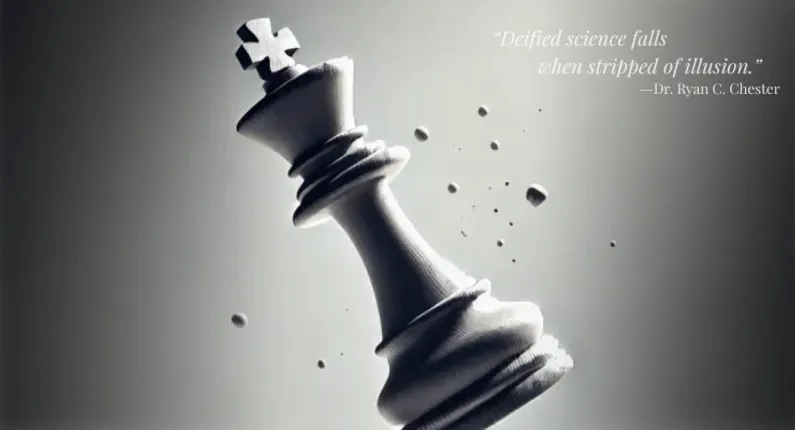
The Dethronement of Science: Part 1—Incantationally Impotent
“Science has spoken!”—And with this declaration all doubt is eliminated; any dissent is summarily dismissed. But what did science say? How did it speak? What does this statement really mean?
Consider the following titles from recent articles:
- “The ‘Science’ Has Spoken.” (link)
- “Science Says Marrying the Right Person Can Make You Richer and More Successful. But Will It Make You Healthier?.” (link)
- “Is U.S. democracy in decline? Here’s what the science says.” (link)
What is going on here? Can science make such claims? On the one hand the claim is used for rhetorical purposes, denoting that which is consistent and demonstrative. On the other hand the claim is used for metaphorical purposes, denoting that a deified or sage-like personality stands behind the claim. In the rhetorical frame the appeal is made to an abstract yet empirical authority. In the metaphorical frame the appeal is made to a relational yet expert origin of authority.
Ironically, both frames are simultaneously conveyed by the appeals to abstract and relational authority. The speaker or writer is at the same time claiming that the abstract principle is demonstratively true, while appealing to a relationally dispassionate authority figure (called Science). The orator or author is riding the coattails of a non-existent sage, as if to say that the speakers authority is as sure as the imaginary sage’s authority. Both frames are also conveyed by appealing to empirical and expert authority. The speaker or writer is concurrently signifying that the supposed underlying empirical analysis conclusively reveals that the claim is true, while also deferring to the indirect knowledge of an unknown yet sage-like expert that must have tested and concluded the accuracy and reliability of such results. Again, the orator or author is riding the coattails of a non-existent sage.
But what exactly is science? Or rather, what is not science. Science cannot speak. Science is not a demigod or sage. The ridiculousness of the declaration, “Science has spoken”, is obvious. The statement personifies the term science, and all that the word conveys, as if it is an intelligent sentient being. However, one cannot rationally evoke the name of Science as if it is a personified deity. The term science signifies an applicable methodology—not a deity.
The problem with how the term science is sometimes used illustrates two well-known fallacies called “ipsedixitism” and the “appeal to the stone”. An ipsedixitism is a dogmatic claim that is said with little to no argumentative support and expects no room for rebuttal. The term originates from the Latin phrase ipse dixit, which means “he himself said it”. The idea is that just because someone says “Science has spoken” or “science says” does not mean that what is asserted is therefore correct. Speaking or writing such things, no matter how passionately delivered, does not guarantee the accuracy of what is said.
An appeal to the stone dismisses arguments or counterarguments as being ridiculous and absurd and therefore being not worth the effort of supplying a rebuttal. The fallacy is so named because in order to dispute the claim to immaterialism, the counter claim entailed kicking a stone as if the action supplied a valid rebuttal, thereby proving that the stone is material (Patey, 1986). However, such a response is not an argument but an action. Nothing is reasoned in rebuttal. In our case, by asserting that “Science has spoken” the speaker is appealing to the stone by dismissing any and all counterarguments against whatever claim her or she has made in the name of science. The claims that “Science has spoken” is the stone that the reasoner kicks. No matter how hard he or she kicks the stone of science’s claim, the stone will still be an unreasoned stone. This proves nothing.
Science is incantationally impotent to effect a rational argument. No matter how much one may want science to speak, it cannot communicate, has no oracular powers, and cannot be evoked to the state of being sentient. The idea of evoking the word science as an authoritative and supporting claim is specious reasoning. Science as a deified concept is dethroned.
Citations
- Gupta, Sujata. “Is U.S. democracy in decline? Here’s what the science says.” Science News (October 18, 2024). https://www.sciencenews.org/article/united-states-democracy-decline-science.
- Haden, Jeff. “Science Says Marrying the Right Person Can Make You Richer and More Successful. But Will It Make You Healthier?” Inc. (October 14, 2024). https://www.inc.com/jeff-haden/science-says-marrying-the-right-person-can-make-you-richer-and-more-successful-but-will-it-make-you-healthier/90987745.
- Patey, Douglas L. “Johnson’s Refutation of Berkeley: Kicking the Stone Again.” Journal of the History of Ideas 47/1 (1986): 139–145. https://doi.org/10.2307/2709600.
- Queen, Chris. “The ‘Science’ Has Spoken.” PJ Media (September 25, 2024). https://pjmedia.com/chris-queen/2024/09/25/the-most-unscientific-presidential-endorsement-n4932817.





